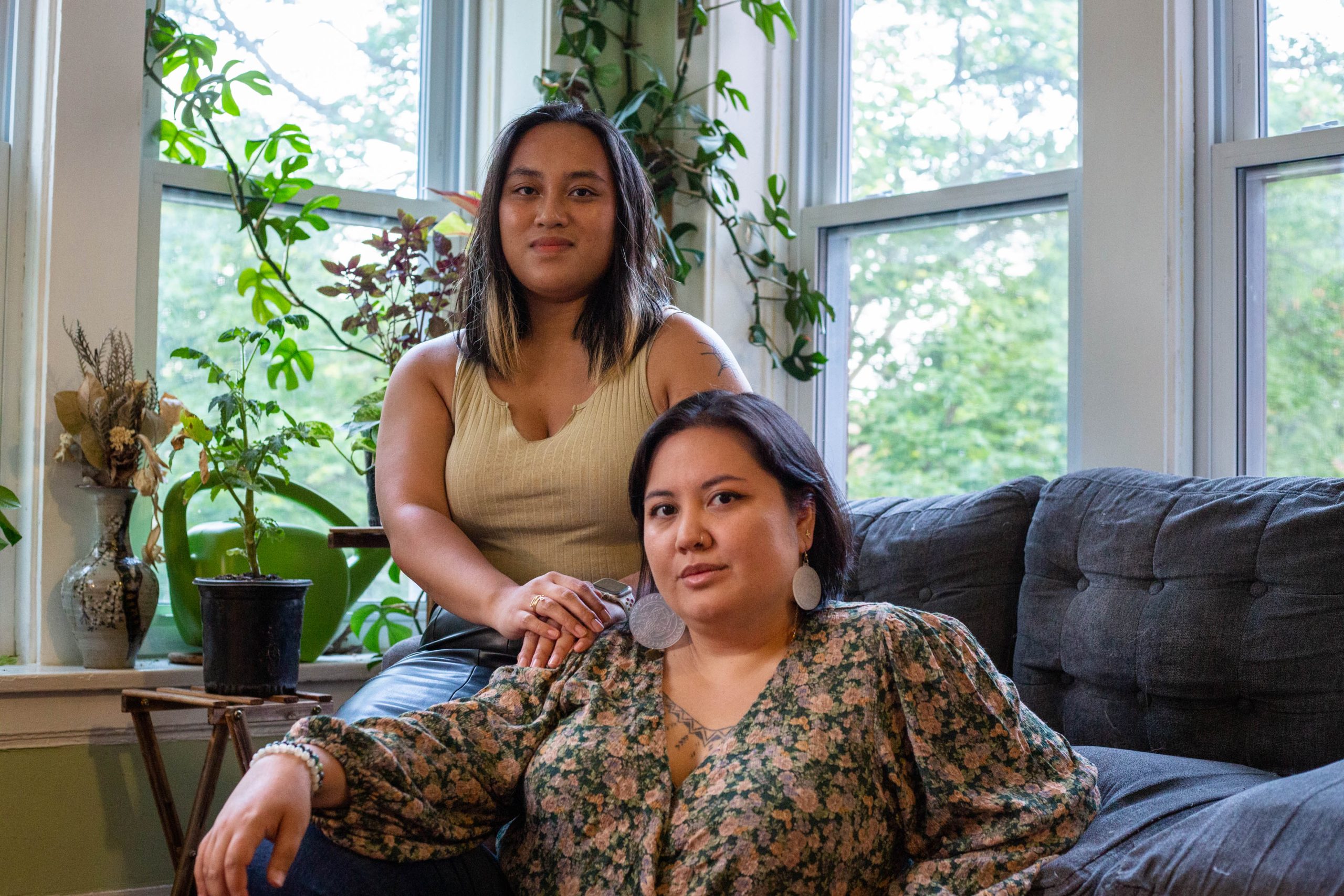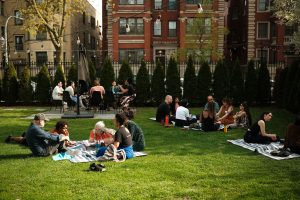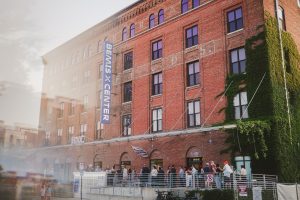Luya Poetry, a Chicago-based poetry organization centering on people of color, celebrated its fourth anniversary and they did it the best way they knew how — through a gathering over food, music, conversation, and, most especially, spoken word. On a warm summer night at Foster Beach, with a crowd eager to attend in-person shows again, founder Chris Aldana and communications director Czaerra Ucol stood side-by-side to welcome the audience. Sticking to Luya’s tradition, Aldana read the community guidelines — framing the expectations for both the audience and the performers, many of whom are people of color and identify as LGBTQIA+. “At Luya, we respect the mic,” she said, then turned the mic to face the audience, asking them to say it back.
Luya’s five community guidelines were established at the time of the group’s founding in July 2018. Although some changes were needed due to the COVID-19 pandemic, these guidelines remain unshaken. Prioritizing everyone’s safety and healing is at the core of Luya’s work — its namesake is the Filipino translation for ginger, which is known for its health properties in immigrant communities.
The crowd repeated the first guideline. “At Luya, we respect the mic,” which asks performers to finish their piece by the three-and-a-half minute allotted time to ensure that they can have as many people perform.
“Poetry is healing and we want to bring that to people,” Ucol said in an interview. “Because we’re so rooted in the principle of organizing for community, we are mindful of the content and are ready to meet each other wherever we’re at.”
Written poetry dates 4,300 years ago, making it the most ancient record of human literature. There are numerous studies about it, especially its impact on people’s physical health. But so far, we have yet to see scientific proof that poetry, or any other art form, can help people live longer or better. Psychophysiology-wise, however, a 2017 Oxford Academic journal concluded that spoken word poetry (also known as recited or performance poetry) can “act as a powerful stimulus for eliciting peak emotional responses.” Responses may appear as chills or goosebumps. Through neuroimaging and behavioral responses, the study found that poetry-elicited chills differ from music-elicited responses. This identifies the spoken word’s unique quality as a form of emotional expression.
To pave the way for authentic emotional expression, where people feel comfortable in their environment, the Luya duo carefully chooses the location of the monthly open mics. During their most recent one, in July, they remained cognizant of COVID-19 precautionary measures. The organizers opted for a socially distant picnic-style event. Aldana reminded the audience of the second guideline — “At Luya, we respect the space.” As visitors to the public beach, Luya’s guests were expected to clean up after themselves. Whether at the Axis Lab in Argyle where Luya had its first show, or the ISA Studios in East Pilsen where they regularly gathered pre-pandemic, this guideline aims to guarantee that they can return to these community spaces.
“I chose that Argyle space intentionally [because] the space was unapologetically pro-immigrant, anti-ICE and pro-working class,” Aldana said in an interview, explaining why they chose Axis Lab, an arts and architecture community organization originally located under the Argyle red line stop. “These are the stories that should be told at Luya.”
The third community guideline reads, “At Luya, the crowd creates the vibe.” While Aldana read lines from a poem, Ucol demonstrated how to respond to a poet on stage. Audience members can snap or even say “rewind” as a way of requesting the poet to repeat a line that stood out.
29-year-old rapper and creative Jofred Estilo is one of Luya’s resident artists. Before Luya, he was a regular performer at Sofar Sounds, a global music company that hosts intimate gigs in cities like Hong Kong, Johannesburg, and London. Summer of 2018, the same time as Luya’s first show, Estilo performed weekly at Sofar Sounds.
“I would like to continue performing for them, but it’s complicated,” he said in an interview. “Sofar is a cool concept, but the reality is, they charge so much for tickets and yet their artists make pennies. That’s why I stopped doing it because I felt like chattel.”
Now, he’s a regular at Luya — mostly performing, but sometimes hosting, too. Most recently, he was Luya’s featured artist in a collaboration event with the University of Illinois at Chicago. In an early celebration of APIDA Heritage Month, he performed his newest single titled “Filipino Road Trip.”
Filipino Road Trip
by Jofred Estilo
So brown boy spread your wings
I hope you fly and realize
That you’ve been great for all this time and what you need is right inside
You don’t need nobody else to try to tell you what you worth
If we made it out of nothing then I still embrace the hurt
“I think a lot of people gravitate towards Luya because we know everybody has a story. I remember we had sixteen or seventeen-year-old kids nervous and stuttering [on stage] and we still snapped and cheered them on and they came back the next month,” he said. “If you have something to say, say it and we will openly hear it without judgment.”
Envisioning Luya’s future, he would like to see Luya open mics (or versions of it) all over the world. “We can use these events to create real change in communities that need it through our art in rapping, singing, or poetry,” he said.
The fourth community guideline states, “At Luya, we understand that anything can be a trigger.” This reminds the audience to care for themselves during the show and prepares the poets to not take it personally if an audience member gets upset or has to step out in the middle of a performance.
“Sometimes, triggering content can be performed without warning and those situations are scary. But at Luya, it’s a supportive space and we really try to center the experience of both the performer and the audience,” Ucol explains.
Ode to the Sampaguita
by Czaerra Ucol
The sampaguita knows a real battle is not only fought on ravaged land, but within the mind too
AP US History scrubs away her mind’s kayumanggi
The Philippine Seas are bottled and upsold to quench colonizer’s thirst
But like Dawn Mabalon, she ensures the cuttings are left full-colored textbooks to push them further than where she was able to start
Caroline M. Watson, theater artist and regular Luya attendee, sees similarities with Luya and Grandma’s House, a Humboldt Park-based poetry show that she started in 2015.
“I think we’re very similar in our ethos and approach to the world… making sure that people feel safe and comfortable,” she said. “Putting people of color and marginalized people to the front of the mic list, always, is something amazing that Luya does. Something that not every show does, which is proof of that care.”
Watson added that Luya’s accessibility efforts embody that care. “They did such a good job of getting the captions figured out and creating a community space of putting the prompts online [beforehand],” she said, referring to Luya’s monthly open mic themes. Themes in the past included joy, autonomy, and solidarity.
Poet and trauma education facilitator, Rise Like the Sun, appreciates that Luya pivoted when necessary during the pandemic. “Being able to perform at Luya virtually helped a lot of artists who are disabled because it was hard for us to get out of the house and [performing] helped me flourish. It gave me more consistency than I ever had in being able to access community spaces with other artists,” they said. “I feel like they [Luya] saw a thing that could be a roadblock, but they’re like, we’ll figure it out.”
Knots
by Rise like the Sun
What if I told you disability and trauma live in the same building?
Separated by one floor
Elevator works when it feels like
My body works when it feels like
Spend most of my energy walking stairs
Luya managed to transition online, but it didn’t happen smoothly. “The thought of trying to translate this thing that I worked so hard on into a virtual space made me so sad because so much of what I love about it can’t be recreated on a Zoom call,” Aldana said. “But I was like, the world is on fire … if there’s any chance that doing this virtually will make my day or anyone else’s day slightly better or provide some kind of release, then it’s worth it.”
Lastly, the fifth guideline states, “At Luya, we do not tolerate fuckery.” Aldana enumerated what fuckery can be — the same reasons that make the world “on fire.” This included, but is not limited to racism, ableism, sexism, transphobia, disrespecting people’s gender pronouns, pro-cop behavior, and disrespecting people’s right to land and sovereignty.
For the Asian women in my life, may we one day be free
by Chris Aldana
We stay safe, we smile for ourselves, a constellation of faces
That can’t be lost in shame or shadowed in expectations
Our hurricane spirits tear down pedestals and build altars to ourselves
We hallow our own bones and together break curse upon curse upon curse
We begin anew
We belong here and everywhere
“Luya is, and always has been, rooted in communities of color and as we know, communities of color are the most vulnerable to state violence and state forces, so we don’t tolerate that type of behavior in this space,” they said.
Watson, whose poems revolve around mental health and her Indigenous identity, uses comedic writing to understand the “injustice and pain in the world.”
My Mania & My Depression
by Caroline M. Watson
My mania and my depression fight for attention
They’re in a sibling rivalry that neither of them will ever win
My depression is eating peanut butter straight from the jar
My depression is showering for forty-five minutes
She’s listening to old voicemails at three in the morning
She’s never asking for help
“Processing difficult ideas and feelings is a lot easier, especially [because] I write with a humorous lens,” she said. “As an educator in art spaces, it’s an impactful way of engaging with young people.”
The community guidelines were inspired by the organizing meetings Aldana attended in the past. “It would be nice if all of us, queer, brown people, could have a night where it was just in our homes,” she said. “These community guidelines are a way for us to say to the people in the room [on] who this space is for and how you can show up in this space.”
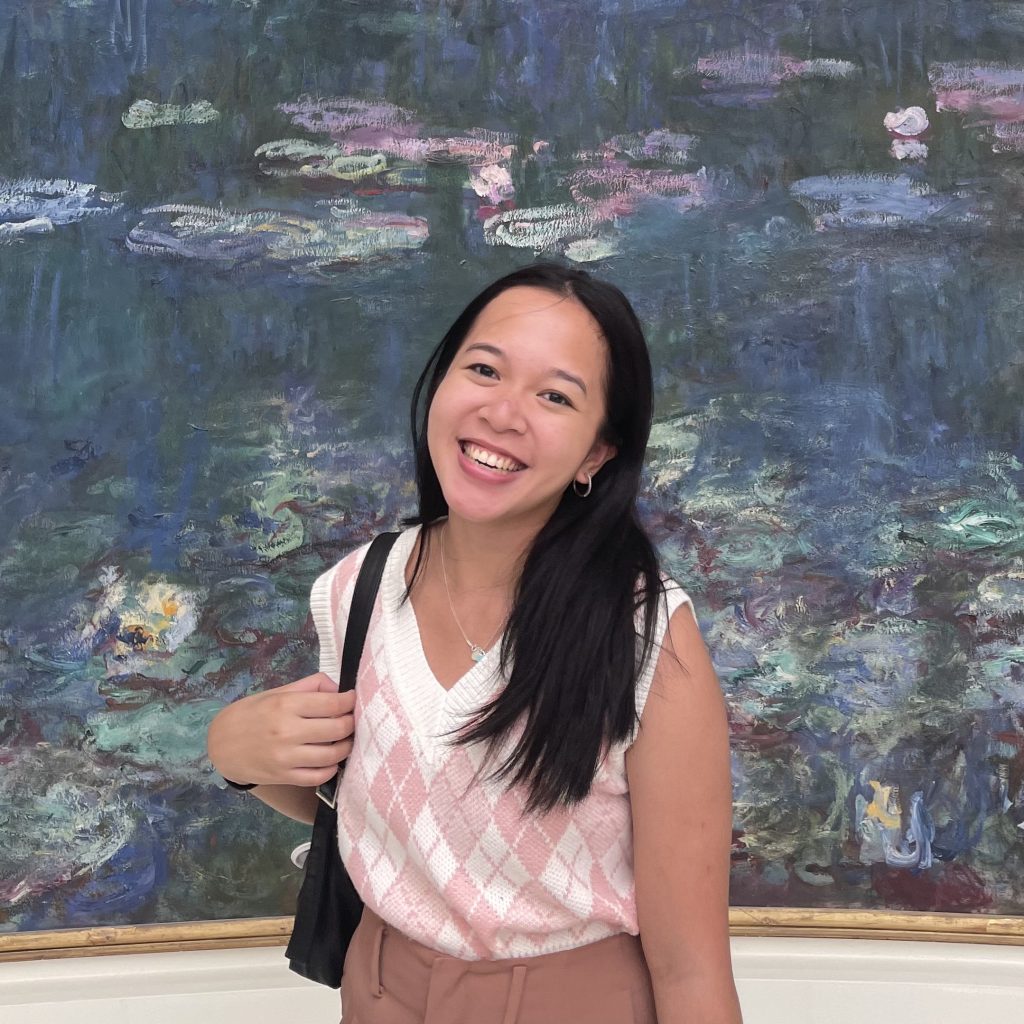
About the Author: Jess Nalupta (she/her) explores the power of storytelling to activate emotion and raise awareness. Hoping to build meaningful relationships along the way, her writing strives to reveal that there is more that connects us than divides us. She is currently based in Chicago, but she grew up in Ilocos Norte, Philippines. She holds a bachelor’s degree in Journalism with a minor in Philosophy from DePaul University.
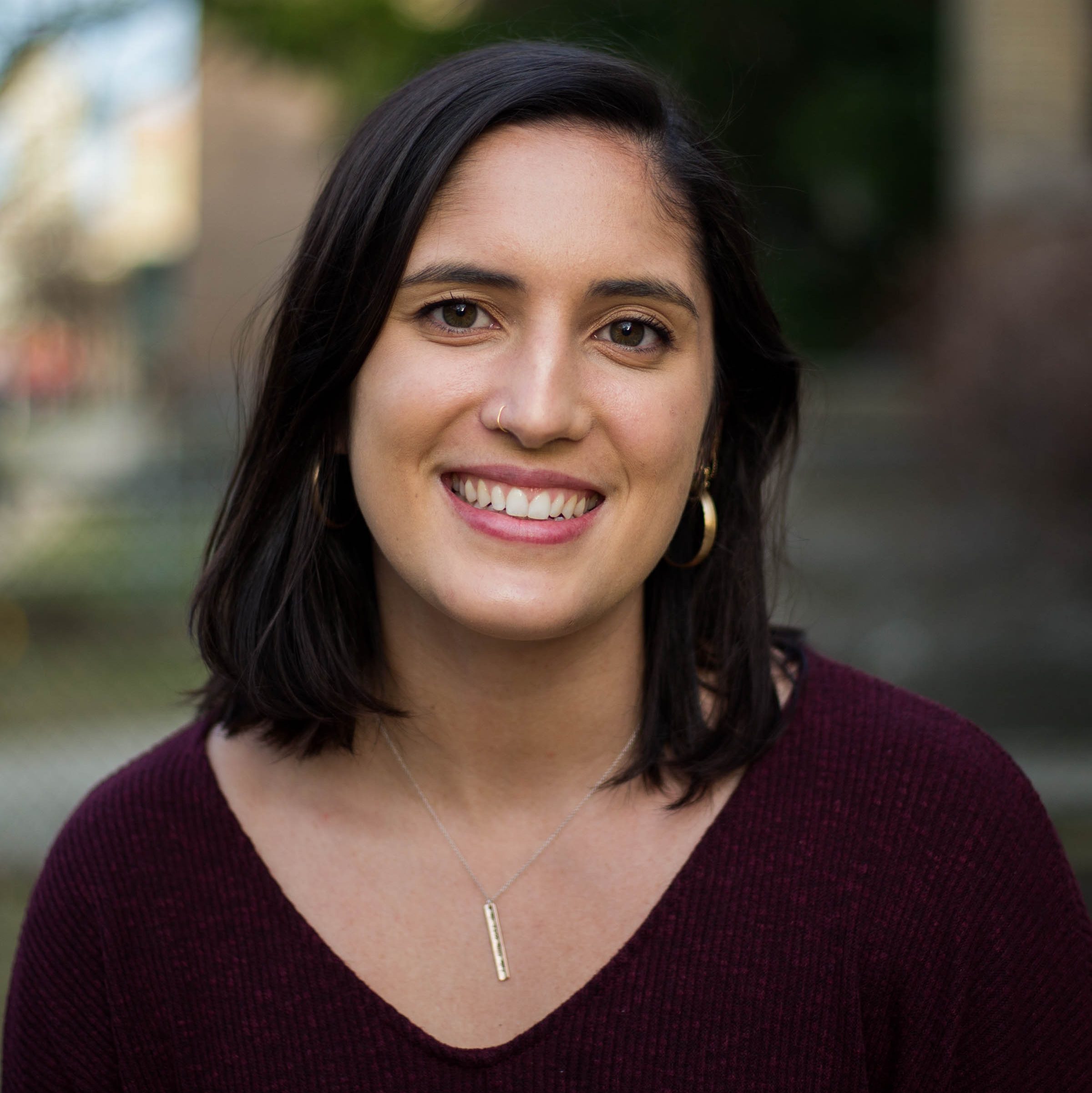
About the Photographer: Caroline Olsen is a photographer, journalist and organizer living in Chicago. Her work centers on making our media and information systems more equitable and dreaming up more liberatory worlds. Website: carolinelolsen.com
